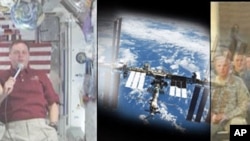When many Americans think of the holidays, they envision snowflakes, a homemade meal and time spent with family. However, that picture is far from reality for the thousands of U.S. servicemen and women stationed abroad this holiday season. Some are serving their nation farther from home than others.
Two U.S. crew members aboard the International Space Station have spoken with American troops in Iraq.
Station Commander Jeff Williams, a retired U.S. Army colonel, and Flight Engineer T.J. Creamer, an Army colonel, talked with U.S. forces Tuesday via a NASA satellite connection in a type of question-and-answer session.
Williams started by thanking the troops for their service and giving an update on the International Space Station's progress.
"We're getting close to the final assembly of the space station," he said. "We will complete its assembly in 2010 and transition to full utilization in this international partnership made up of the Russians, the U.S., Japanese, European Space Agency and the Canadian Space Agency."
In addition to discovering similar challenges and rewards in their work with international partners, the astronauts and troops found common ground in facing the difficulty of being away from family and friends for months at a time.
The astronauts told soldiers that their own experiences in the military had prepared them to face the day-to-day struggles of being in space. They noted values such as teamwork, a dedication to mission and perseverance are vital whether working on Earth or while orbiting 354 kilometers above it.
News
Space Station Astronauts Talk with Troops in Iraq
update







